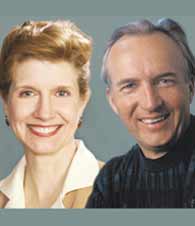|
Executive Interviews: Interview with Don Peppers and Martha Rogers on CRM
January 2008
-
By Dr. Nagendra V Chowdary
A word about Peppers & Rogers
Group
Peppers & Rogers Group was formed
in 1993 by Don Peppers and Martha
Rogers, after the publication of their
first book, The One to One Future:
Building Relationships, One Customer
at a Time. On the basis of this book,
Peppers and Rogers were frequently
asked to make presentations to
companies wrestling with the newly
available interactive technologies of
the World Wide Web. Technology
companies launching new, interactive
applications often relied on Peppers
and Rogers for advice on how tomake
these technologiesmore attractive and
useful to
|
|
their clients. Soon Peppers &
Rogers Group launched a weekly
email newsletter (nowcalled the "1to1
Weekly") and a bimonthly controlledcirculation
magazine ("1to1"). These
publications are read by some
1,50,000 professionals involved in
managing customer relationships and
interactive marketing activities. The
company also began hiring
management consultants, and
establishing other offices around the
world. Peppers and Rogers
themselves, meanwhile, wrote more
books exploring the issues involved in
interacting with customers Enterprise One toOne (1997), The One
to One Fieldbook (1999), The One to
One Manager (1999), One to One B2B
(2001), Managing Customer
Relationships (2003), Return on
Customer (2005), and their latest one,
soon to be released, Rules to Break and
Laws to Follow (2008). In 2003 Peppers & Rogers Group
officially became part of Carlson
Marketing, themarketing services arm
of the globally recognized firm of
Carlson. Some of Carlson's other
brands include Carlson Wagonlit
Travel, Radisson Hotels, TGI Friday
restaurants, and Regent Seven Seas
Cruises. Outside of the US and the
UK, Peppers & Rogers Group is still
independently owned and operated,
with a large number of clients
throughout Europe, the Middle East,
Africa and Latin America. -
What is "One to One, End to End"
all about? How has been the
experience with this goal?
The original goal of joining Peppers &
Rogers Group with CarlsonMarketing
was to be able to offer clients more
than mere consulting. Increasingly,
companies trying to use technology to
improve their customer relationships require not just expertise and counsel,
but execution. Programs have to be
implemented and managed,
individual customer dialogs need to
be anticipated and guided, and the
fruits of better customer relationships
can only be realized after substantial
investment of time, ingenuity, and
labor. The PRG Carlson offering
known as "One to One, End to End" is
now a kind of all in one service,
allowing a client company to get not
just an effective strategy from the
world's most respected relationship
consultants, but also a seamless
execution from the world's most
experienced relationship program
managers. So far, our experience with
this offering has been very promising. -
What have been the major changes
in CRM practices during the last
decade? Were there any strategic
inflection points? Has 'digitization'
(doing business online)brought in new
dimensions to CRM? Is it getting to be
more of a science (quantification and
lot of statistics included) than an art?
Ten years agomost companies had not
yet implemented any serious
customer relationship programs, and
were still considering what strategies
should be emphasized, and how the benefits should be measured. The
early adopters usedCRMtechnologies
primarily to streamline operations
and cut costs, which are easily
quantified benefits, but these goals
had largely been achieved in many
sectors by 1999 or 2000. The dot-com
meltdown from 2000-01 not only
substantially dampened many
companies' enthusiasm for Internet
applications, but also created a strong
demand for measurable results on the
revenue side. CRMcould no longer be
justified purely on the speculation
that increased customer satisfaction
would result in financial gains
sufficient to pay the costs, in other
words. The main problem with
justifying CRMon the revenue side of
the business was quantification. CRM
doesn't necessarily build short term
sales, but it can have the effect of
substantially increasing customer
lifetime values, and while this
principle is easily acknowledged,
calculating the actual value created by
a CRM program can be quantitatively
ambitious. Nevertheless, it is not all math.
There is still a substantial element of
pure good judgment involved in
treating different customers
differently. The key ingredient of any
company's success in this field is not
so much their sophistication in
analytics, but their orientation as a
company toward earning and keeping
the trust of customers. -
Ninety nine percent of marketing
focuses on how to sell to customers.
Very little attention is paid towhy and
how customers should sell
themselves to marketers. As a
customer, do you ever think about
how you can get a leg up on your
competition the other customers
competing for the attention and
goodwill of the seller?
Companies that can be trusted by
buyers to act in the buyer's interest are
few and far between. Whenever a
customer finds a company that can be
trusted, it isworth some investment to
ensure that the relationship
continues. In the B2B space, buyers
may actually compete with other
buyers, and depending on the
business, the most effective strategy
for ensuring that an effective buyerseller
relationship continues is to
focus on constantly improving the
trust, mutuality, and openness of the
relationship. This means not just
respecting the individual interests of
each buyer, but protecting the
commercially confidential
information provided by each buyer.
If you're the customer seeking to win
the favor of a supplier, or to earn the
'loyalty' of a supplier, our suggestion is
that the same basic formula applies:
make it easy for the supplier to sell to
you, remember important supplier
information to minimize the trouble a
supplier must go to in order to sell to
you, and always deal openly and
honestly with the seller, in order to
earn the seller's trust.
1.
CRM Strategy Case Study
2. ICMR
Case Collection
3.
Case Study Volumes
|
